Toledo, Ohio. On the 5th of October, 1892, he passed a successful examination before the Supreme Court of Ohio, discontinued his school work and entered into the practice of law. He opened an office in Sylvania, and also associated himself with L. W. Morris, of Toledo, until the latter went upon the Common Pleas bench, when Mr. Jones took offices in the Spitzer Building in Toledo. Mr. Jones has always taken an active interest in educational affairs. He served ten years as a member of the County Board of School Examiners, resigning said office to take his seat as a member of the Seventy-fifth General Assembly. He has been President of the Board of Education of Sylvania for six years. Mr. Jones was re-elected to the House of the Seventy-sixth General Assembly on the 3d of November, 1903. He received the highest vote cast for any candidate on the victorious Republican ticket in Lucas County. In politics Mr. Jones has always been a faithful and unswerving Republican. He is a member of the Modern Woodmen of America ; Commander of Enterprise Tent, No. 138, K. 0. T. M.; Secretary of Sylvania Lodge, No. 289, F. & A. M., and an Elk.
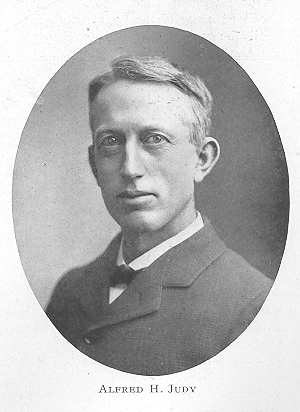
Alfred H. Judy, Of Greenville, Ohio, member of the House of Representatives of the Seventy-sixth General Assembly, was born on the 8th of June, 1861, at Enon, Clarke County, Ohio. He is the son of Samuel H. Judy and Lyda Wilson Judy, both natives of Ohio, his father being of Swiss-German descent, while the mother comes from English-Irish stock. The name Judy, formerly spelled Tschudi, occupied a prominent place in the early Swiss history. Members of the family being prominent in State, Art and Literature. Mr. Judy's father, Samuel H. Judy, was a stock dealer and farmer, as well as a successful business man, adhering to the strictest principles of honor, and rearing his family on the same plane. Mr. Alfred H. Judy passed his early life as a farmer boy, and learned many lessons in his early years which afterwards became of great advantage in maturity. He received his education at the district school near Greenville, Ohio, until the age of twelve years, when he entered the High School of that place, graduating from there four years later with the exceptional average, grade of 97. He started in public life at the age of eighteen, teaching in the district and graded schools -with marked success, later engaging in farming and stock dealing, which occupation he still follows. In 1897 he entered an active mercantile career, doing an annual business of $30,000, in selling farming implements, buggies, etc., which business he originated at Castine, Ohio, selling the same in October. 1903. He was appointed a member of the commission to locate and secure options on lands for a State Hospital for Insane by Governor Herrick in June, 1904, an important position, and one requiring good judgment and business ability. During all his active life he has been a staunch Democrat. He was a magistrate of B utler Township, Darke County, for eighteen years, during which time he never had a decision reversed 'by the higher courts. He resigned
- 425 -
from this office in October, 1903. In the fall of that year he was elected a member of the Seventy-sixth General Assembly, defeating the candidate on the Republican ticket, Harvey Dursham, one of the strongest men in the opposite party in that district. While a member of the Legislature he belonged to the following standing committees : Turnpikes, Claims and Hospitals for the Insane. He was also appointed a member of the committee to draft the State Highway Bills, introduced by Mr. Wertz and Mr. Fisher. He drafted that part of the bill which pertained to counties having pikes already built and introduced House Bill No. 149 to limit telephone rates in. the State of Ohio. This bill was fought by the Bell Telephone Company and killed in the Committee on Railroads and Telegraphs. He also introduced House Bill No. 168, to provide heaters and radiators for the vestibules of street cars. This bill passed the House with 81 votes, was reported favorably in the Senate, but was tabled for the benefit of the Cincinnati Traction Company. Mr. Judy's ability as a legislator was recognized by his opponents, as well as by his friends. In taking part in the fight on the famous Harrison School Code, Mr. Judy bitterly opposed the measure as it was offered, and he offered many of the twenty amendments to the code, all of which were voted down. Finally he made a brilliant speech against the adoption of the code. This splendid effort won him the admiration of his political opponents, and stamped him as one of the strong men of that legislative body, and a leader of the Democratic minority. He was elected Treasurer of the Farmers' National Congress at St. Louis on the 27th of September, 1904. On the 16th of February, 1884, Mr. Judy was united in marriage to Miss Jeanette Coblentz, daughter of Harrison and Caroline Coblentz. Mrs. Judy is a talented, well-educated lady, a splendid entertainer and a good business woman. Three children are the fruit of this union, Edith, Kate and Harrison Judy. Mr. Judy is a member of the United Brethren Church. He resides in the summer on his farm, located two and one-half miles northwest of Castine, Ohio, while in the winter he is to be found at No. 415 Wayne Avenue, Greenville, Ohio.
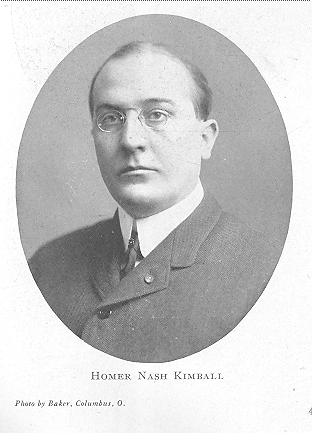
HOMER NASH KIMBALL., Deceased, late Superintendent of the public schools of Madison, Lake County, Ohio, and member of the House of Representatives of the Seventy-fifth and Seventy-sixth General Assemblies from the joint Geauga-Lake Districts, was born on the 11th of October, 1867, on the farm n ear Madison where his parents and grandparents had lived since 1812. The Kimball family is one of the oldest in the Western Reserve, coming West when the country was only sparely settled and living on the same farm continuously. They came from New Hampshire, and the whole family, fathers and -mothers, are of New England birth and training, and those of every branch have descended from Revolutionary stock. Young Kimball was educated in the public school and High School of Madison, and graduated from Oberlin College in 1890. In 1892 he was chosen Superintendent of the village schools at Madison, where his excellent management and
- 426 -
scholastic attainments have contributed much to make them the best in that part of the State. Mr. Kimball served since 1891 continuously as Clerk, Councilman and Mayor of Madison, and also for a term of eight years on the County Board of School Examiners for Lake County. He was a Republican in politics. His father and grandfather were among the staunch adherents of that faith in a section that has always been known as the Gibraltar of Republicanism in Ohio. Being busily engaged in his duties as teacher and Superintendent, Mr. Kimball had but little time to work in politics, but at the urgent request of his home people, he accepted the nomination for Representative in 1901. He was elected in the fall of that year by a very large majority, and re-elected in 1903. While a member of the Seventy-fifth and Seventy-sixth General Assemblies, Mr. Kimball had an active part in the codification of the municipal and school laws of the State. He was one of the owners of the Madison "Review," .a weekly paper of quality published in Madison. Mr. Kimball had been engaged in several business enterprises, and also served on the Board of Directors of two banks. He died on the 31st of August, 1904.
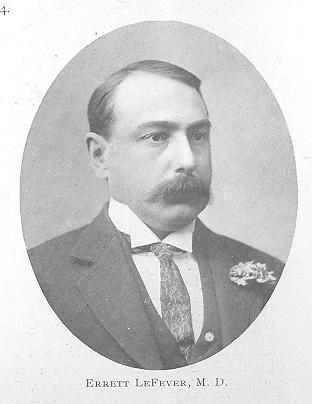
Errett LeFever, M. D. Of Marietta, Ohio, was born on the 13th of February, 1867, on a farm in Homer Township, Morgan County, Ohio. He is the son of Isaac and Basha Shepard LeFever, both of whom were native Americans, the father having his birthplace in Pennsylvania, and the mother being a native of Ohio. Isaac LeFever, the father, followed the occupation of house carpenter during his active life. The mother before her marriage was well known in educational circles for many years, and was a successful school teacher in the public schools of Ohio. The son, Errett, received his early education in the county schools, supplemented by careful instructions from his mother, proof of whose careful guidance is found in the fact that at the age of seventeen he was able to start in public life as a school teacher in the county schools where but a few years previous he was a scholar. Entering the Ohio University at Athens, he received a special course of study, and then, deciding to take up the study of Medicine, he entered the Medical College of Ohio, from which institution he graduated in 1890. Since that time he has been very successful in his chosen profession. Dr. LeFever has always been a staunch Republican, and has served his party in many capacities. In 1900 he was elected a Representative from Morgan County to the lower House of the Seventy-fourth General Assembly. Again he received the nomination for the Seventy-sixth General Assembly, and was re-elected by an increased majority. During both sessions, Dr. LeFever was one of the most prominent members of that body. He naturally became interested in legislation pertaining to his profession, and was made a member of the Committees on Hospital for, the Insane, and Medical Jurisprudence. He was also a member of the Committee on Railroads and Telegraph, and
- 427 -
after the adjournment of the Legislature, Governor Herrick appointed him a member of a commission to select a site for a new Insane Hospital. The Doctor was made Chairman of this committee. Socially, Dr. LeFever belongs to the Masonic fraternity, I. O. O. F., K. of P., and the Medical Society of Morgan County. For many years Dr. LeFever was located at Mountville, but since 1904 he resides and practices at Marietta, Ohio. The doctor has been married twice. His first wife was Miss Julia Howard. After her death he married Miss Lola Howard, and by this union he is the father of two children, Harry Everett and Ruth Ernestine LeFever. The family are members of the Protestant faith.

John J. Lehmann, Attorney at law at Fremont, Ohio, and member of the House of Representatives of the Seventy-sixth General Assembly from Sandusky County, was born on the farm in Scott Township of his native county on the 4th of October, 1863. His father, Leodegar Lehmann, at the age of ten had emigrated from Baden, Germany, in 1833, while his mother, Barbara (Staub) Lehmann, was born in the same year on the ocean near the American side. Mr. Lehmann worked for his parents on the farm until he was twenty-one years old. During his boyhood days his parents were in moderate circumstances and had experienced many of the hardships incident to early farm life in this country. He attended the public schools in the winter time and received a good common school education. As soon as he became twenty-one years old he began to attend school at Ada, Ohio, the next year he began farming for himself in summer and teaching school during the winter months. In the year of 1887 he was nominated without any opposition for Township Clerk of Scott Township, and was elected by the largest majority of any one on the ticket. He was re-elected to a second term, again receiving a large majority. He fulfilled the duties of this office with credit to himself and to the entire satisfaction of the people of his township. As a school teacher, he soon became one of the most popular in the west end of the county, and in the year 1892 he was tendered the Principalship of the Rising Sun schools, which position he accepted and held for two years. As soon as he began teaching in Rising Sun, he disposed of his farming implements, and during the summer months began reading law in the office of O'Farrell & McSheeny, of Fremont. Immediately after he severed his connections with the Rising Sun schools he took up the study of law at Ada, Ohio, where he completed his course and was admitted to the bar on the 4th of October, 1894. He began the practice of law and removed to Fremont in September, 1895, and is now engaged in practicing law and prosecuting pension and patent claims, and has become one of the most successful pension and patent attorneys in Northern Ohio. Mr. Lehmann has always been a staunch Democrat, a hard worker for his party, and is an able speaker. Ever since he has been a voter he has always taken an active interest
- 428 -
in caucuses and conventions, and has always given his support to the entire Democratic ticket. During the time he has lived in Fremont he has been Chairman of more Democratic conventions than any other man within the same period. In the year of 1901 he was nominated by his party for County Representative, but was defeated in the landslide of that year by the small majority of 31 votes. On the 6th of April, 1903, he was renominated by the Democratic primaries and elected in the fall of the same year by a plurality of 1015 votes, receiving nearly 300 votes more than any other man on the ticket. While being a member of the Legislature, Mr. Lehmann was a member of the standing committees on Judiciary, Federal Relations and Institution for the Blind. He introduced and secured the passage of the following bills : House Bill No. 165, providing that all land owners must build one-half of all partition fences ; thus revolutionizing the fence laws of Ohio. House Bill No. 320, limiting the time of the committee appointed by Common Pleas Judges to examine the County Commissioner's report to thirty days. In many counties these committees were charging for one hundred days' time and more, when in fact the reports in most instances could be examined in ten or fifteen days. House Bill No. 202, giving County Commissioners of adjoining counties the power to act jointly under the Gehrett Road Law in building county line roads. House Bill No. 449, giving courts the power to fine for contempt in cases of nuisances of a recurring character. This is legislation that is directly aimed at the strawboard mills located on the Sandusky River near Tiffin, Ohio. For years the people of Seneca and Sandusky Counties, along the Sandusky River, and especially in the city of Fremont, were complaining of the strawboard company polluting the Sandusky River. This pollution of the river at different times killed nearly all the fish for a distance of fifteen or twenty miles below the strawboard plant, and tons of dead fish went floating down the river and lodged along its banks. The waters of the Sandusky River then became unfit for use and the stench at times became unbearable. Mr. Lehmann took up. this cause of the people and promised them that in case of his election he would secure- the ,passage of a bill to prevent the continuance of this nuisance. He began early in the session, introducing a number of bills aimed at the straw board mill on, the Sandusky River. He finally succeeded in securing the passage of House Bill No. 449, thus relieving his people from a meat nuisance. He also introduced and secured the passage of House Bill No. 468, and House Bill No. 560.
Mr. Lehmann is a member of the Modern Woodmen of America, and has been clerk of his home Camp for nine years. He also belongs to, and is Financial Secretary of the Catholic Mutual Benefit Association of Fremont, Ohio, and belongs to the Knights of Columbus, Maccabees, Woodmen of the World and Home Guards of America. He was married to Miss Lillian B. Fry, of Sandusky County on the 16th of October, 1894. They have four children, Lester L., Ruth E., William Elbert, and John.
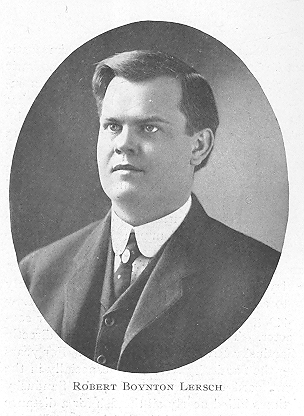
Robert Boynton Lersch, A member of the House of Representatives of the Seventy-sixth General Assembly of Ohio, and a prominent merchant of Elyria, Lorain County, that State, was born on the loth of November, 1871, at Elyria. His father, John Lersch, was a native of Germany, and his mother, Pamela Boynton, a native of Ohio. His education was obtained in the Elyria Public Schools, graduating from the High School in 1889. Later he took a course in the law school of the Western Reserve University. After finishing his education he became identified with the firm of John Lersch & Co., the principal dry goods business in Lorain County. Mr. Lersch has always taken an active interest in Republican politics. His first step into public life was taken at the age of twenty-seven, when he was elected a member of the City Council
- 429 -
in his home city. This position he held for four successive terms, being elected and re-elected in 1898, 1900, 1902 and 1903. In the summer of 1903 he was the choice of the Republican convention of Lorain County for member of the General Assembly, he being in opposition to six other candidates and gaining the nomination on the first ballot. His election followed in the fall of the same year. During the session of the Seventy-sixth General Assembly, Mr. Lersch was one of the most efficient members of that honorable body, and was a member of the standing committees on Cities (Secretary), Manufactures and Commerce, Public Buildings and Lands (Chairman), and Taxation. Socially, Mr. Lersch is connected with King Solomon's Lodge, F. & A. M.; Marshall Chapter No. 47; Elyria Lodge, B. P. O. E., and Elyria Tent; K. O. T. M. On the loth of November, 1897, he became a benedict, marrying Miss Helen Seward. They have one child,
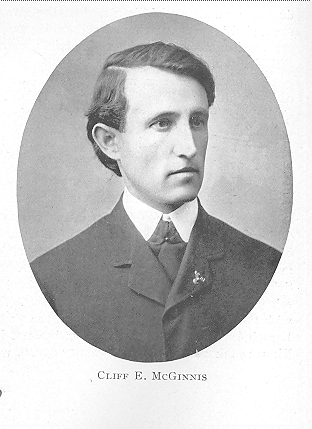
Cliff E. McGinnis, Attorney at law at Sidney, Ohio, was born on a farm near Plattsville, Ohio, on the 15th of November, 1875. He is the on of Thomas S. McGinnis and Laura B. Woodward McGinnis, both of whom were native Ohioans. Mr. McGinnis received his early education in the public schools of Covington, Ohio ; at the Sidney Business College,_ and later took a course of study in the Ohio State University. Starting in public life, in 1897, at the age of twenty-two years, he was elected Clerk of Clinton Township, Shelby County, including Sidney, on the Democratic ticket, and was the only Democrat elected to that office in twenty-six years. His preferment to office was due not alone to his natural ability, but as well to the regard in which he was held by a large circle of friends for his affableness of manners and pleasant characteristics. Previous to his entering the Ohio State University, he was employed as bookkeeper for five years. In 1902 he was made Deputy Clerk of Shelby County, and in 1903 was elected on the Democratic ticket a member of the Seventy-sixth General Assembly. While a member of that body he belonged to the following standing
- 430 -
committees : Banks and Banking, Claims, Fees and Salaries, Taxation, and Institution for Feeble-Minded Youth. He is, as mentioned above, a resident of Sidney, Ohio, where he enjoys a splendid law practice, and where he is the center of a host of personal friends who aim to continue his political career for the service of his party and his people. He is a member of the K. of P., Elks, Knights of Kohrassen, and Independent Order of Foresters. On the 15th of September, 1901, Mr. McGinnis was married to Miss Mary D. Fisher, a resident of his home city.
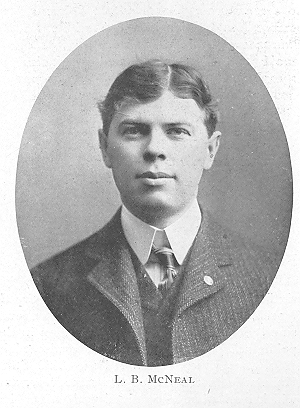
L. B. McNeal, Attorney at law at Marion, Ohio, ranks among the best-known younger members of the bar of Central Ohio, and he undoubtedly has a brilliant future before him. Mr. McNeal was born on the 28th of April, 1868, at Marion, the son of Hon. J. F. McNeal, a lawyer of the highest standing. He obtained his early education in the public schools of his native town, and after a three years' course in the High School, entered the preparatory department of Wooster University, at Wooster, Ohio. After his graduation from this well-known institution, Mr. McNeal entered Cornell University, from where he graduated in 1892. He is a member of the Phi Kappa Psi college fraternity. After his graduation he immediately took up the study of law, spent two years with his father ; was admitted to the bar in June, 1894, and became a member of the firm of J. F. McNeal & Sons. Mr. McNeal has always been a faithful Republican. In the fall of 1901 he was elected Representative from Marion County in the lower House of the Seventy-fifth General Assembly, where he was a member of the standing committees on Judiciary, Military Affairs, and Public Works. He resides in Marion.
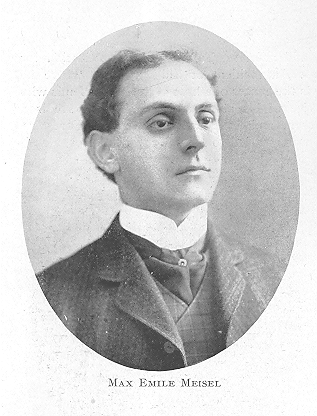
Max Emile Meisel, A young and prominent member of the bar of Cuyahoga County, with offices located in the Williamson Building, Cleveland, Ohio, was born in the Forest City on the 12th of August, 1876. He received his early education in the public schools of his home city, attending Cleveland Central High School, graduating from there in 1893. His education was completed in Adelbert College, and he is a graduate with the class of 1897. Resolving to devote his future to the practice of law, Mr. Meisel finally attended the law school of Western Reserve University, graduating in 1900. In that year he was admitted to the bar and entered immediately upon the practice of his profession. A close student of economics and political conditions, Mr. Meisel is particularly well adapted to successfully fill the duties of his profession. Although a young man in years, he has manifested an energetic ability and much natural power in public affairs. He has always been a staunch adherent
- 431 -
of the Democratic belief, and has served his party in many capacities. In the fall of 1901 Mr. Meisel was nominated by the Democratic convention of Cuyahoga County for State Representative, and thereby he enjoys the distinction of having been the youngest member of the Cuyahoga County delegation and of receiving the largest number of votes cast in the November election of 1901. In the Seventy-fifth General Assembly, Mr. Meisel was a member of the standing committees on Enrollment, Finance, Revision, and Universities and Colleges. He was one of the most valuable members of that body, both in the committee rooms and on the floor of the House. In the summer of 1902 he was the nominee for City Solicitor of Cleveland, but his opponent on the Republican ticket won by a small majority. Mr. Meisel enjoys the confidence of a large and lucrative clientele and the esteem of his fellow practitioners.
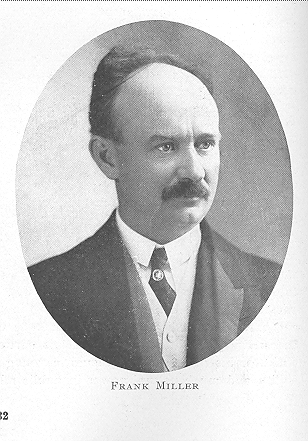
Frank Miller, Representative from Crawford County in the House of Representatives of the Seventy-sixth General Assembly, was born in Crestline, Crawford County, Ohio, on the 11th of March, 1863, and he has lived there ever since. He obtained his early education in the public schools of his home, and graduated in 1881, after which he entered the Ohio State University in the fall of the same year, and which institution he attended until 1883. He then read law at Crestline, and was admitted to the bar in the fall of 1887. He was engaged in the practice of his profession until 1893, at which time he started what is known as the Crestline Live Stock Feeding Station, which business he now owns and manages at Crestline. Mr. Miller is also in a number of manufacturing enterprises, and is one of the Board of Directors of the Bench Plow Works Company. Politically, Mr. Miller has always been connected with the Democratic party and has served the party of his choice often and faithfully. He was elected Mayor of Crestline in 1896, served for two years, and was re-elected in 1898, which office he filled until 1900. In the fall of 1903 Mr. Miller was elected to the Legislature by a large majority. He was a
- 432 -
member of the standing committees on Cities, Universities and Colleges, and Soldiers' and Sailors' Home. On the 16th of October, 1889, Mr. Miller was married to Miss Hattie N. Short, of Belle Center, Ohio.
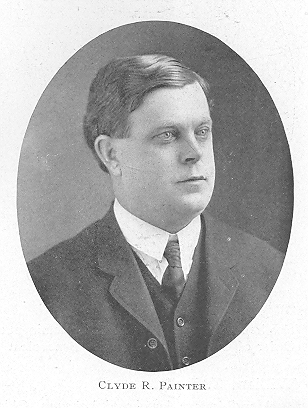
Clyde R. Painter, Attorney-at-law at Bowling Green, Ohio, and member of the Seventy-fourth and Seventy-fifth General Assemblies, is among the best-known citizens of the northwestern part of the State. He was born in Bloom Township, Wood County, near Bloomdale, on the loth of February, 1866, and where he has always resided. His mother was of Scotch-Irish extraction, while his father was of German parentage. He was admitted to the bar after a most thorough education at the Ohio Normal University at Ada, and the Ohio State Lniversity at Columbus, and has since been continuously engaged in the practice of his profession in Wood and surrounding counties. Mr. Painter has always been a staunch Republican, and in every campaign since he has reached his majority has been a potent force in advocating the doctrines of his party. He has served two terms in the General Assembly, and was conspicuous for his work along the lines of general legislation. It is not too much to say that he was among the leaders of the Republican majority, and his advice and good judgment were often sought. As Chairman of the House Committee on Judiciary he had much important work to do, and the record shows that he did it well. He was also a member of the House Committee of Twenty-three having in charge the municipal code at the special session of 1902, and Chairman of the Republican Standing Caucus. Mr. Painter is an able debater, a forceful and convincing speaker and a conscientious lawyer who has the confidence of his clients and the esteem of his fellow practitioners.

Franklin P. Riegle, Attorney at law at Bowling Green, and Representative from Wood County in the Seventy-fourth and Seventy-sixth General Assemblies, is a native of the State of Michigan, where. he was born on the 14th of May, 1870, in Van Buren County. When Mr. Riegle was but a few months old his parents removed to Delaware Township, Hancock County, Ohio, and resided there until their son had reached the age of fourteen years, when the family Moved to Jackson Township, Wood County. Since that time Mr. Riegle has lived in that part of the State. Mr. Riegle is of German extraction, his grandparents having emigrated from the Fatherland. He obtained his early education in the district schools of his home county, and subsequently attended Findlay College and the well-known Ohio Normal University at Ada, Ohio. After leaving that institution at the age of seventeen, Mr. Riegle commenced to teach school, and continued in that profession until he was
- 433 -
admitted to the bar, finishing the law studies at the Ohio State University. In this profession he has been a very successful man, and has enjoyed a splendid reputation for probity, legal knowledge and honesty of purpose. He has always been an active working Republican, and in the fall of 1899 he was elected to the lower House of the Seventy-fourth General Assembly, and re-elected to the Seventy-sixth General Assembly in 1903. During his membership in that body Mr. Riegle attracted the attention of the leaders of his party by his oratorical powers, sound judgment and aggressiveness. He was an important factor in the legislation which afterwards became known as the School Code of Ohio, and he led the fight in the House for the bill abolishing spring elections, which made him very popular throughout the State. In 1895 he was married to Miss Maggie J. Dunn, an educated, refined and accomplished young lady. Mr. Riegle lives with his family in Bowling Green, where also he has his law office. He is a prominent member of the Knights of Pythias, Independent Order of Odd Fellows, and the Benevolent and Protective Order of Elks.
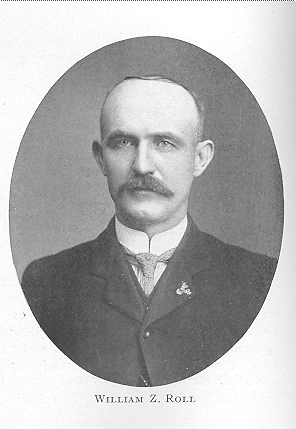
William Z. Roll, A well-known lawyer of Lebanon, Ohio, and member of the. House of Representatives of the Seventy-fifth and Seventy-sixth General Assemblies, was born on the 14th of October, 1865, at Butlerville; Warren County, Ohio, the son of David and Laura Long Roll, both of whom were natives of the Buckeye State. The family is of German descent, the grandfather coming to this country in the year of 1830, while the grandmother was but twelve years ,old when she left her native country, Alsace, and emigrated to America. His parents being poor, he worked on the farm in summer and attended school during the winter, until 1886, when he received a teacher's certificate and taught school for a period of six years. Desiring to obtain an academic education, he carefully saved the :money earned by him, and upon acquiring sufficient. funds he came to Lebanon and entered the National Normal University, graduating from that seat of learning in 1893 with the degree of Bachelor of
- 434 -
English. After leaving college he became Principal of the Utica school, which position he held for seven years. Becoming interested in the Valley Telephone Company, he was made general manager of that corporation. While holding this position Mr. Roll entered upon the study of law in the office of Mildon Bird and M. C. Drake, prominent lawyers of Warren County. He was admitted to the bar in 1903. and at once took up the practice of his chosen profession, in which he has so ably succeeded. Mr. Roll is also the manager of the Miami Valley Fruit Company, of Fort Valley, Georgia. As a Republican, Mr. Roll was in 1901 elected to the House of the Seventy-fifth General Assembly, and after the expiration of his first term, having served with distinction, he was re-elected to a second term in the fall of 1903. While a member of that honorable body, Mr., Roll was a, Chairman and member of many important standing committees. He introduced and secured the passage of a bill requiring County Commissioners to act upon those bills only which have been filed at least five days previous to any action taken upon them by the Commissioners. He is an Elk, I. O. O. F., Red Man, and Knight of the Golden Eagle. Mr. Roll has been identified with the military affairs of the State. At present he is a member of Company H, First Regiment, and belongs to the State Rifle Team. He was one of the twelve who went to Seagirt, New Jersey, for competing with the rifle teams of other States for prizes. At the target competition in 1904, at Newark, Ohio, he came within three points of winning the championship of the State in the 1,000-yard range. He was married on to 22d of December, 1889, to Frances G. Bird, by which union he is the father of five boys and one girl. His residence and office are located in the city of Lebanon, Ohio.
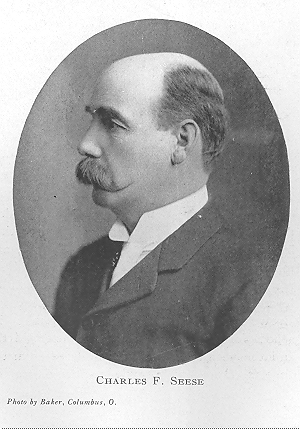
Charles F. Seese, One of the notable acts of the Seventy-fifth General Assembly was the law establishing State Normal Schools at Athens and Oxford, under the fostering care and maintenance of the commonwealth. The act was an innovation in the educational record of the State and placed Ohio in line with the progressive colleagues in the Union. The author of the bill was Hon. Charles F. Seese, a member of the House from Summit County, and Chairman of the Committee on Common Schools. Mr. Charles F. Seese, who has spent his life in the care of education and is to-day known as one of the most advanced in his chosen profession, is of German ancestry, both on his father's and his mother's side. He was born in Tuscarawas County on the 21st of December, 1858, and received his education in the common schools of his section. select private schools and the National Normal University. After graduating he began the noble profession of teaching, and is now so engaged at Central High School of Cleveland. His father- was one of the leading men in his part Of the State, and during the War of the Rebellion tried to enlist in the service of his country, but got no further south than Camp Chase, Columbus, where he
- 435 -
was rejected for physical disability. On the 29th of August, 1881, Mr. Seese was married to Miss Luella May Cummins. Mr. Seese has always been a Republican, and at different times has been Township Clerk, County School Examiner for four consecutive terms of three years each ; Superintendent of the public schools at Hudson, Ohio, for eleven years, and member of the Seventy-fourth and Seventy-fifth General Assemblies. In 1903 Mr. Seese was prominently mentioned as one of the candidates for School Commissioner, but he withdrew his name before the Republican State Convention. During his term of service as legislator, Mr. Seese was known as one of the effective men of the House, both on the floor and in the committee rooms, and he left his impression on much of the legislation enacted by these Assemblies. He was particularly active along the lines of educational work, and was one of the staunchest friends of the Ohio public school system, doing all in his power for the enlargement of its scope of usefulness. Mr. Seese resides in Hudson, Ohio.
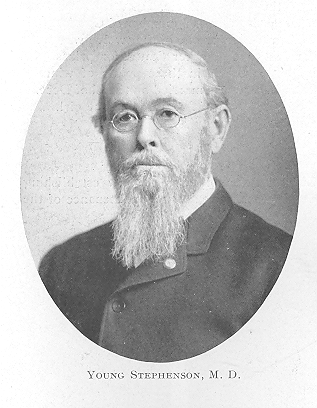
Young Stephenson, M. D., Member of the House of Representatives of the Seventy-sixth General Assembly from Brown County, Ohio, is a native of the Buckeye State. He was born on the 19th of April, 1834, on a farm in Brown County. His father, Robert P. Stephenson, was a native of Ohio, while his mother, Mary Wallace Stephenson, was born in Mason County, Kentucky. Colonel Mills Stephenson, the grandfather of Dr. Stephenson, was born in the State of Delaware. He emigrated to Mason County, Kentucky, in 1792, and came to Ohio two years later, in 1794. Colonel Stephenson served in the Indian War and through the War of 1812. He built Fort Stephenson, at Fremont, Ohio, by order of the. Governor, and it was given his name. His wife, formerly Jane Kilpatrick, was a daughter of Frank Kilpatrick, who was a native of Ireland, and emigrated to America in 1791. In 1791 he came down the Ohio in a flat-boat with his two daughters, Elizabeth and Jane. When just above Maysville, Kentucky, then known as Limestone, the Indians endeavored to decoy them ashore, but failed. They fired upon him and killed him. His daughters came on to Limestone, where they saw their father buried. They were taken by Richard Applegate, of Mason County, and reared to womanhood. Afterwards Jane married Colonel Mills Stephenson, who died on the 3oth of June, 1815. Dr. Stephenson received his education in the public schools of Ripley, Ohio, and afterwards attended Wesleyan University for four years. At the commencement of the Civil War he returned to Brown County. He started into public life at the age of twenty-three years, teaching school for ten years. In 1864 he attended the Ohio Medical College at Cincinnati, Ohio, and the year following he graduated from the Starling Medical College at Columbus, Ohio. In 1866 Dr. Stephenson located in Georgetown, where he practiced until the present day.
- 436 -
The Doctor has been a lifelong Democrat. He served as a member of the Board of Education of Georgetown for nine years, of the Town Council for four years, and was President of the Brown County Teachers' Institute for four years. He also was elected Clerk of the Courts at Georgetown, and served six and a half years. On the 3d of November, 1903, Dr. Stephenson was elected to the Legislature from Brown County. While a member of the House of Representatives he served in the standing committees on Insane Asylums, Public Printing, and Ditches, Drains and Water Courses. Socially, Dr. Stephenson is a member of the I. O. O. F., Daughters of Rebeccah, K. of P., U. R. of the K. of P., Brown County Academy of Medicine ; State Medical Association, American Medical Association, and for twelve years Surgeon of the Third Regiment. On the 3d of December, 1857, Dr. Stephenson was married to Miss Susan Van Anda. He is a member of the Methodist Episcopal church at Georgetown, Ohio.
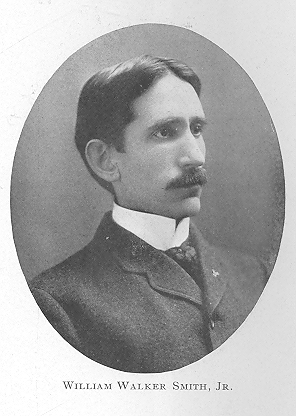
William Walker Smith, Jr., A member of the Ohio State Legislature, and one of the prominent young attorneys of Cincinnati, was born in Covington, Kentucky, on the 21st of November, 187o, and is a son of William Walker Smith, who is at present engaged in the real estate business in Cincinnati, but was formerly member of the wholesale grocery firm of Hill & Smith, that for many years was engaged in business at No. 45 Vine Street, Cincinnati. Mr. Smith was three years old when his parents moved from Covington to Walnut Hills, where he has lived ever since. His early education was secured in the public schools of Cincinnati, and he afterwards completed a course of study, in 1887, at the Franklin School. At Cornwall-on-the-Hudson, New York, he subsequently pursued the higher branches and was there graduated in 1891. Immediately afterward he took an extended tour in Europe, during which time he paid particular attention to the study of municipal affairs in London, Dublin, Edinburgh, Paris and Berlin. Upon his return, he studied law in the old Cincinnati Law School,. under Jacob D. Cox. His offices are in the First National Bank building, Cincinnati. Mr. Smith was married to Blanche Pogue, who is the eldest daughter of the late Henry Pogue, whose sketch and portrait appear elsewhere in this work. For a long period Mr. Smith has been prominent in Masonry, and no less so in the Ohio Society of the Revolution and the Elks. He is the President of the Walnut Hills Business Club. He is also a factor in politics, and has an enthusiastic following, who see in him, as a man of education, travel, enlarged views and proper public spirit, a leader of influence and ability. He is now serving his second term in the Ohio State Legislature, having been first elected in 1901, and re-elected in 1903.
- 437 -

David D. Spangler, Of New Bavaria, Ohio, Principal of South Ridge Special School, was born on the 19th of May, 1868, in Henry County, near New Bavaria, Ohio. He is the son of Godfrey Spangler, a shoemaker by trade, and Anna M. Mess Spangler, both natives of the old country, the father emigrating from Bavaria in 1848, and the mother from Luxemburg in 1847. The parents met and were married at Defiance, Ohio, in 1855, where they resided a few years, after which they moved to New Bavaria into the wilds of the Black Swamp. Hardship, trials and privations confronted them continuously, until, the life becoming unendurable, they decided to move from that neighborhood, and with a family friend, Jacob Yetter, they made their way to St. Paul through the unbroken forest. They remained in St. Paul for a period of four years, but again deciding to brave the hardships of New Bavaria, they returned and have lived there ever since. They saw the magnificent primeval forest fall under the ax of the frontiersman, and beautiful gardens, productive fields and happy homes appear in its stead. Mr. David D. Spangler received his early education at St. Paul, in the St. Francis Institution, the Catholic Normal School and the Pio Nono College, at Milwaukee, Wisconsin, from which institution he graduated on the 23d of June, 1893, as valedictorian. Finding it necessary in early life to make his own way in the world, he studied telegraphy and was employed as operator on the Wisconsin Central Railroad at Plover, Wisconsin. Later, taking up the profession of teaching, he accepted the position of Principal of the schools, at Decatur, Indiana, and also that of organist at St. Mary's Church in that city. Subsequently he came to his present location, where he occupies the positions of Principal of South Ridge Special School and organist of the Sacred Heart Church of New Bavaria. In religious belief, Mr. Spangler is a Catholic, and is a member of the Catholic Knights of Ohio, and since 1896 Secretary of Branch 37 of that organization. In politics he has always been a staunch Democrat, and he was nominated and elected Representative from Henry County in the lower House of the Seventy-sixth General Assembly in the fall of 1903. While a member of the General Assembly he belonged to the following committees : Common Schools, Boys' Industrial School, and Elections. He introduced "A bill to allow Liberty Centre, Ohio, to transfer certain funds," which passed the House, but was lost in the Senate ; "A' two-cent fare 'bill on railroads," "Ditch notices and copies thereof," "Huckster bill," "Tile drain protection," and "A bill creating a Township Ditch Supervisor." On the 16th of August, 1893, he married Mary F. Cook, and by this union he is the father of six children—Paul B., Esther C., Mary E., Henry A., Ursula C. and Clara A. Spangler.
- 438 -
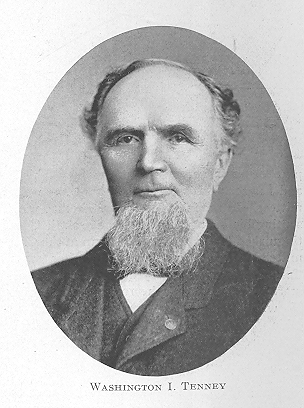
Washington I. Tenney, Miami County has always been worthily represented in the Ohio General Assembly, and Hon. Washington I. Tenney, of Troy, who represented his county in the lower House of the Seventy-fifth and Seventy-sixth General Assemblies, was no exception to the high-class officials sent by the people of that section to represent them in the halls of legislation. Mr. Tenney is a native of Montgomery County, Ohio, where he was born on the 3d of May, 1833. His education was secured in the common schools, except one winter spent in Columbus, where he attended the High School of which Asa D. Lord was Superintendent. Mr. Tenney has always been a stalwart Republican, and cast his first vote for General John C. Fremont for President in 1856, believing in the policies and principles of that party from its birth. He entered the service of his country for one hundred days, as a member of Company D, One Hundred and Forty-seventh Regiment, O. V. I., stationed at Fort Ethan Allen. He was also with his command at Fort Stevens, when General Jubal Early undertook to capture the city of Washington. In Miami County he has on several occasions been honored by his fellow citizens. He was a member of the Agricultural Board, and its Secretary for more than twenty-five years, member of the Troy Board of Education nine years, and County Auditor two terms. In Om Mr. Tenney was elected a member of the House of Representatives and his record showed a diligent and industrious servant of the people, always on the side of the people and always caring for their wants. The result was, that he was re-elected in the fall of 1903 by an increased majority. Mr. Tenney's father, Dr. Eli Tenney, born in 1809, was an allopathic physician, a member of the Ohio Legislature in 1856, and County Auditor one term. He died suddenly in office on the 15th of September, 1873. Mr. Tenney's mother, Margaret A. Hatcher Tenney, was born in Virginia in 1809, came to Ohio with her parents early in life, and was married in 1830. In 1858 Mr. Washington I. Tenney married Jennie C. Kelly, and to them were born eight children, five boys and three girls, all of whom are living save one daughter, who died in 1891. Mrs. Tenney passed away on the 21st of May, 1901, beloved by all who knew her. Mr. Tenney is an honored member of the G. A. R. He is now superintending his large farm. For twenty years Mr. Tenney was a teacher of high repute in his county. He is a sturdy, manly man, of excellent judgment, and one whom it is a pleasure and delight to know. In all the relations of life he has been true to himself and his friends, and his record is one of which his children and the community in which he lives may well feel proud.
- 439 -
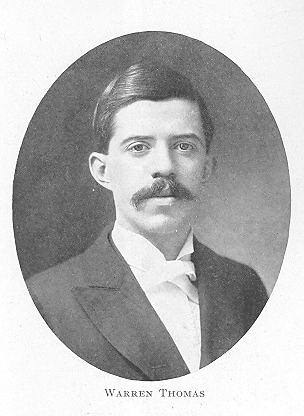
WARREN THOMAS, A prominent attorney at law at Warren, Ohio, and a member of the House of Representatives in the Seventy-sixth General Assembly, was born on the 27th of October, 1876, in Niles, Ohio, the birthplace of President McKinley. He is of Scotch-Irish descent, and the son of Melanchton Thomas, who was engaged in the piano business, and Emma Calhoun Thomas, whose people came to this country before the War of the Revolution, and fought on the battle-fields during the struggle for independence, and also on those of the War of 1812 with England. Mr. Warren Thomas was educated in the public schools of his native city, and is a graduate of the High School at Cortland, Ohio, class of 1896. After his graduation he began the study, of law in the office of Tutle & Fillius, a leading law firm of Warren, Ohio. In October, 1899, Mr. Thomas was admitted to the bar and immediately began the practice of his profession. During all his active career he has been a faithful Republican, and has served his party as speaker, as well as a member of Central and Executive Committees. In the fall of 1903 Mr. Thomas was elected to the halls of the Legislature, representing his county in the Seventy-sixth General Assembly. While a member of that distinguished body, he was Chairman of the Committee on Enrollment and a member of the Committees on Judiciary and Privileges. His marriage occurred on the 19th of March, 1902, his wife being a former resident of Cortland, Ohio, Miss Lenora Hall. His office is located at Warren, Ohio.

Carmi A. Thompson, One of the most successful members of the bar in the city of Ironton, Ohio, was born on the 4th of September, 187o, in Wayne County, West Virginia, in which State his father had lived. The ancestors of Colonel Thompson were Scotch-Irish, and had fought in the Revolutionary, and Mexican Wars. He received his education in the public schools of his native city and entered the Ohio State University, from which institution of learning he graduated, in 1892, with the degree of B. Ph.. taught school two years, then went back to the Ohio State University, where he graduated in
- 440 -
1895 with the degree of LL.B. Commencing the practice of law immediately after leaving college, he opened an office, in 1895, at Ironton, and in 1897 formed a partnership with W. D. Corn, which lasted until June, 1903, since which time he has practiced his chosen profession under his own name. In politics Colonel Thompson- is one of the recognized leaders of the Republican party in his home district, and takes an active part in each campaign as a speaker. He was appointed City Solicitor in 1896, for an unexpired term. His name was placed before the people for election for the same office, resulting in his election for three successive terms. In 1903 he was again favored by his party and the people, being elected a member of the lower House of the Seventy-sixth General Assembly. While a member of that body, he belonged to the standing committees on Judiciary, Taxation and Military; Affairs. He is a Mason, Elk, I. 0. 0. F., K. of P. and Golden Eagle. For a number of years he has 'been closely affiliated with the Ohio National Guard, entering that military body in 1892. He was Captain of Company I, Seventh Regiment, at the outbreak of the Spanish-American War, in 1898, and saw active service for a period of nine months. He is at the present writing Colonel of that regiment, and in June, 1904, during the disturbances at Hanging Rock, he had charge of the military forces that were sent there. On the 3d of June, 1899, Colonel Thompson was married to Leila Ellers, a resident of Illinois, by which union he is the father of one daughter. Colonel Thompson's office is located at No. 151 Centre Street, Ironton, Ohio.
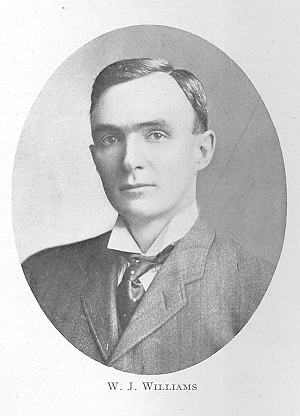
W. J. Williams, Attorney at law at Youngstown, Ohio, and one of the two Representatives in the lower House of the Seventy-fifth and Seventy-sixth General Assemblies from Mahoning County, is one of the best-known younger Republicans in the northeastern part of Ohio. He was born on the 21st of May, 1869, on a farm ten miles east of Youngstown, and received the first rudiments of an education in the district schools of his home county, after which he spent five years in the normal' and collegiate departments of Mt. Union College. He finally attended Puget Sound University, at Tacoma, Washington, graduating from that institution with the degree of A.B. In college, Mr. Williams was a member of the S. A. E. college fraternity. Returning to Youngstown, Mr. Williams studied law in the office of Hine. & Clarke, and in 1895 he was admitted to the bar before the Supreme Court of his native State. Immediately after his admission to the bar, he took up the practice of his profession, which proved to be very successful. Later he formed a partnership with Hon. E. H. Moore, the prominent Democratic leader from Youngstown, and one of the ablest lawyers of the State, the firm name being Moore & Williams. After dissolving this partnership, Mr. Williams became a partner of Congressman Kennedy, of Youngstown, which partnership lasted until the 1st of January, 1904. Since then Mr. Williams
- 441 -
is engaged in the general practice of law under his own name. In politics Mr. Williams has always been affiliated with the Republican party, taking an active part in the affairs of that party. In the fall of 1901 Mr. Williams was elected to the House of the Seventy-fifth General Assembly, in which body he served with distinction ; and at the expiration of his first term of office he was re-elected by an increased majority. In both sessions he was Chairman and a member of a number of important standing committees. He took an active part in the debates regarding the different measures, and his advice was often sought and followed. In 1895 he was united in marriage to Miss Sarah L. Cooper, daughter of J. A. Cooper, of Strouthers, Ohio. His law offices and residence are located in the city of Youngstown, Ohio.
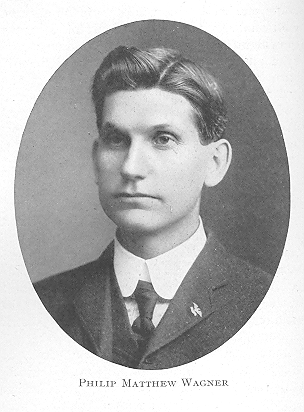
Philip Matthew Wagner, Was born on the l0th of August, 1868, near Sandyville, Tuscarawas County, Ohio. His father, Christian F. Wagner, came to this country from Wurtemberg, Germany, about the year 1845. His maternal grandfather, Frederick Pfersich, came to this country in 1817 with the original Zoarites, but refused to unite with their communistic organization. Hence, he went over the hills near Zoar and entered Government land, where the mother (Matilda Pfersich Wagner) of the subject of this sketch was born and yet lives. Philip M. is the fifth of a family of nine children—eight boys and one girl. He spent his early years on the farm. At the age of fourteen he became a carpenter's apprentice, but after two years of service gave up the idea of learning the trade, believing that his calling was in another direction. He at once devoted his time and energies toward completing his common school education. Later he entered the Eastern Ohio Normal School at Sparta (Pierce P. O.), Ohio, where he prepared himself for teaching. He taught school in the country and village schools of the county, and was instructor in German in Scio College for several terms. His teaching was through the winter months, while he attended college during the spring and summer. Thus, while earning a livelihood, he also secured a college education. Having that spirit of self-reliance and independence, he asked help from no one. Through his untiring efforts he graduated from the Ohio Normal University with the degree of Bachelor of Pedagogics, and later received the Master's degree, and from Scio College with the degree of Bachelor of Philosophy, later receiving the Master's degree. In 1893 he entered the Ohio Medical University, from which he graduated with honors in 1896. He was President and orator of his class and, since graduating, has been called back to his Alma Mater on three different occasions to deliver addresses. After graduating at O. M. U., he located at Columbia City, Indiana, where he practiced medicine for fifteen months, after which he returned to his native county, and located at Canal Dover, where he has built up a lucrative practice and an enviable reputation. While the Doctor
- 442 -
is a very busy man, he finds time for the use of his pen. In 1893 he published the first product of his pen, a small volume of poems, "At the Dawn." His second effort is now ready for the press. After returning to his native county he was appointed a member of the Dover Board of School Examiners, on which he served till 1900, when he was elected a member of the Board of Education. In 1903 he was re-elected by an overwhelming majority. His experience as teacher and examiner made him a valuable factor on the Board. Mr. Wagner has been a member of the Board of Censors of the Tuscarawas County Medical Society for several years, and is at present a member of the Tuscarawas Hospital Association. In fraternal circles he is a member of the Tribe of Ben Hur, the Royal Arcanum and of the Fraternal Order of Eagles. In 1903 the Republicans of Tuscarawas County were looking about for a man who would be able to overcome the Democratic majority. Dr. Wagner was the man centered upon to make the race. Not being a politician, the task was new to him. He practiced his profession most of his time, and campaigned at his leisure. However, in the face of his indifferent campaign he was elected by a plurality of ninety-six over his Democratic opponent, who was a candidate for second term. As a member of the House of Representatives he has .proved himself to 'be a man of conviction, courage and fearless determination. He can not be led by party bosses. As a member of the Committees on Common Schools, Villages and Boys' Industrial Schools, he has shown himself as a man of power and determination. With such men at the wheel, our State and nation would certainly have nothing to fear as to their welfare.
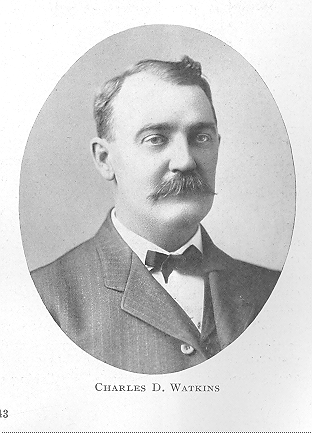
Charles D. Watkins, M. D., I ember of the House of Representatives of the Seventy-sixth General Assembly from Licking County, Ohio; is a product of Fultonham, Muskingum County, Ohio, where he was born on the 22d of September, 1864. His father, Dr. John Watkins, was a native of Maryland ; his mother, Mrs. Sarah .Southard Watkins, was born in Virginia. Dr. John Watkins was of Welsh descent, and was elected Representative from Muskingum County on the Whig ticket in 1840. He was one of the leading physicians of Muskingum County. His wife was a descendant of the first settlers of Virginia. Dr. Charles D. Watkins received his education in the common schools and Columbus Medical College, and graduated from this institution in March, 1886, receiving the degree of M.D. He entered into the practice of his profession immediately, and has met with gratifying success. He is also a director of the Columbus Sporting Goods Company. The Doctor is an enthusiastic Republican, and ever ready to serve his party when called upon. He was elected to the Legislature in the fall of 1903, and enjoys the distinction of being the first Republican ever sent to the General Assembly from the strongly Democratic Licking County. While a member of the General Assembly, Dr. Watkins served in
- 443 -
the standing committees on Public Works, Institution of the Deaf, Railroads and Telegraph. He belongs to the Subordinate, Rebekah and Encampment branches of Odd Fellows; to Subordinate, Knight Templar and Shrine branches of Masonry ; to the Modern Woodmen of America, and the Elks. Dr. Watkins was married to Miss Essie M. Farrell, of Columbus, Ohio, on the 26th of January, 1887. Mrs. Watkins died on the 7th of April, 1903, leaving four children—Irma V., Ruth M., Marcia and Charles H. Dr. Watkins is a resident of the little village of Etna, Licking County, Ohio.

Edwin S. Wertz, Member of the House of Representatives of the Seventy-sixth General Assembly, and attorney at law at Wooster, Wayne County, Ohio, was born on the 7th of August, 1875, at Dalton, and is descended from one of the early German settlers of the county. His parents are W. H. H. Wertz, Vice President of the First National Bank, of Dalton, Ohio, and Carrie Virginia (Slusser) Wertz. Mr. Wertz received his education in the common schools of his home, after which he entered Wooster University as a Senior Preparatory student, remaining one year. He subsequently attended the Ohio State University at Columbus, from which institution he graduated in June, 1899, and in June, 1900, receiving the degrees of Ph.B. and LL.B. His capacity for hard work is shown by his completing work scheduled for seven years in five years (a four years' literary course and a three years' law course), at the same time earning part of the money to pay for his education by working on the daily newspapers. He also was editor of the college paper and one of the editors of the College Annual, and was one of the founders of the Athenaeum Literary Society of the Ohio State University. When the Spanish-American War broke out, he enlisted as a private in Battery H, First Ohio Volunteer Light Artillery, leaving college to serve his country in the field. He served from the first call for troops until mustered out at the close of the war. On the 24th of September, 1900, he was elected Second Lieutenant in Battery H, 0. N. G., and served until the 11th of February, 1902, when he resigned. Mr. Wertz is a strong advocate of Democratic doctrines, and has served his party faithful in many ways. In 1902 he was a member of the Democratic Executive Committee of Franklin County, and in 1904 of the Wayne County Democratic Executive Committee. He was also President of the Young Men's Democratic Club, of Columbus, Ohio. He was nominated by primary election for Representative of Wayne County in the summer of 1903, and elected in the fall of the same year by a large majority. In the House of the Seventy-sixth General Assembly he soon became one of the leaders of the Democratic minority, took part in every important debate, and left his impress on much of th legislation enacted by that body. He fought bitterly the bills changing the election laws of the State and the Chapman bill abolishing spring elections, attacking the motives behind
- 444 -
the passage of the latter bill in a lengthy speech. In the Legislature he served the people faithfully, and always worked for their interests. He gave his constituents of all classes a "square deal," protected their interests and .promoted their welfare. A number of bills introduced by him were killed in committee rooms, among them a bill prohibiting the use of free railroad passes by all State, county and municipal officials and by all of the Judiciary of the State ; also a bill ending and abolishing all perpetual franchises. He was a member of the Committee on Common Schools, and took the stand in all matters that came before the committee that the State owes an equally good education to each child in the State, no matter whether the child resides in the most remote rural district or resides in the most populous city. He championed the cause of the rural schools, and introduced four school bills looking towards their betterment. They provided for (I) thirty-two weeks' school, with regular graded courses of study so far as possible, for each elementary school ; (2) teachers' certificates good in one county, good in any county ; (3) requiring the employment of teachers for the full school year ; (4) giving voters of townships, as well as Boards of Education, the right to vote for or against centralization of schools ; (5) compelling attendance of teachers at county institutes at $1 per day of actual attendance. These bills were incorporated in the School Code. He was a member of the Committee on "Public Ways," and changed an unimportant committee into one of the most important of the session. The Wertz "Good Roads" Bill passed by the General Assembly creates a State Highway Department under a competent Engineer, who has supervision of the repair and maintenance of all roads and of the construction of all new roads. It provides that the State shall pay part of the expense of constructing improved roads. Under it the gradual permanent improvement of the roads will be begun in a systematic manner, so that much of the money at present wasted will be used to advantage. The bill had the approval of the leading agricultural papers of the State, and m arks the beginning of the construction of good roads in Ohio. Socially, Mr. Wertz is a member of Sigma Nu Fraternity ; of Arlington Lodge, I. 0. 0. F., of Dalton, Ohio ; of Cedar Lodge, F. & A. M., of Orrville, Ohio ; of Massillon Commandery, Knights Templar ; of Dalton Tent, K. 0. T. M., and a member of the United Commercial Travelers.
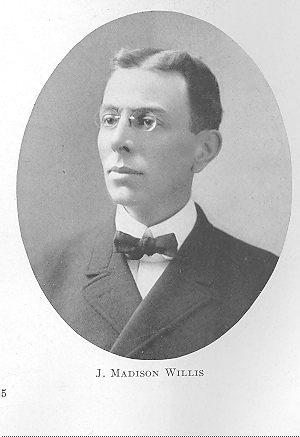
J. Madison Willis, Representative from the Fayette-Madison Counties District in the lower House of the Seventy-fith and Seventy-sixth General Assemblies, was one of the youngest and most valuable members in that body. He was born on a farm, near Bloomingburg, Ohio, on the 19th of October, 1869. He was brought up on a farm and educated in the public schools of the county, but, more fortunate than most boys reared on the farm, he subsequently had the advantages of an education more extended than that acquired at a district school. After pursuing a course at Bloomingburg High School, young Willis entered the University at Ann Arbor, Michigan, matriculating there
- 445 -
in 1888 and remaining until the death of his father, in 1890. He immediately came home and took up the business of his father, that of farming. Mr. Willis has added the breeding of fine stock, which combines profit with pleasure. He is also identified with banking interests. Mr. Willis has always been an enthusiastic, faithful Republican. In 1901 he was elected to the Legislature by a majority of over 1,400 in the Fayette-Madison District. He was re-elected to the same position in the fall of 1903 by an increased majority. During both terms of office he has proved to be an untiring, energetic and faithful servant of the people of his community and the citizens of Ohio in general. In both terms Mr. Willis was Chairman and member of important standing committees. Socially, he is a member of the Masonic fraternity ; Garfield Commandery, K. of P., No. 28, and of other beneficial societies. He is a great-grandson of Nathaniel Willis, founder of the Scioto "Gazette" in 1796, and printer of the first journals of the Legislature of Ohio, and the laws of the Territory. He was married in June, 1892, to Miss Dollie C. Kellen of Oakland. Two girls have been the issue of this marriage.
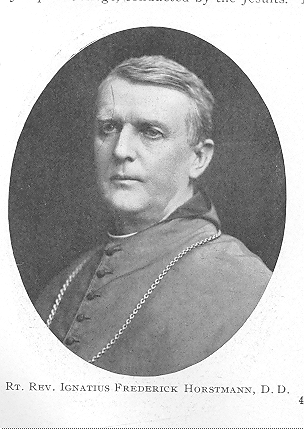
Rt. Rev. Ignatius Frederick Horstmann, D. D., Third Bishop of Cleveland, was born in Philadelphia—or, rather, the part of it that was then the District of Southwark—on the 16th of December, 1840. His parents, natives of Germany, came to this country in early life, and his father was a very prominent and prosperous business man in the city of his adoption. Young Ignatius began his education in a private academy conducted by Madame Charrier and her daughter, Mlle. Clementine, and situated on German Street, east of Third Street. From this institution he passed to the Mount Vernon Grammar School, and having finished the regular course with distinction, was promoted to the Central High School, from which he graduated in 1857, with an exceptionally high average. Indeed, those who were then and previously his classmates say that he was always at the head of his class. Upon leaving Central High School he entered St. Joseph's College, conducted by the Jesuits. Evincing a strong inclination for the priesthood, he later attended the preparatory seminary at Glen Riddle, being one of the first of its students. Bishop Wood was so pleased with his aptitude for and application to study that he chose him as one of the first whom he sent to the newly established American College in Rome. There he continued to fulfill the promises that he had already uniformly given, and soon took foremost rank in the classes of the Propaganda, winning a number of medals in literary and oratorical contests. Completing the prescribed course of studies, he was elevated to the priesthood in the Eternal City on the l0th of June, 1865, by Cardinal Patrizzi. He continued his studies at Rome, and a year later obtained the degree of Doctor of Divinity. Returning to Philadelphia, he was, in the latter part of 1866, appointed Professor of Logic, Metaphysics and Ethics, as well as of German and Hebrew, in St. Charles Borromeo's Seminary, in the old building at Eighteenth and
- 446 -
Race Streets, where he remained until 1871, and afterwards at Overbrook, Pennsylvania. There he remained until the close of 1877, when he was appointed pastor of St. Mary's Church at Philadelphia. He served this parish with admirable ability and tact, and drew to the church large congregations to hear his learned and interesting discourses. So carefully did he manage the finances of the parish that when he left, after having been in charge considerably less than eight years, there was a balance of over nineteen thousand dollars to the church's credit. In September; 1885, Archbishop Ryan appointed him Diocesan Chancellor, which important and exacting position he filled with distinguished ability, till his elevation to the Episcopate, in February, 1892. As Chancellor he had more leisure for literary work than he had as a pastor. His extensive learning and critical taste have been of use not only to himself, but also to the intelligent Catholic reading public in his valuable labors on the editorial staff of the American Catholic Quarterly Review. In addition to attending to the works so far referred to, he was Spiritual Director of the Catholic Club and Chaplain of the Convent of Notre Dame, including the spiritual direction of three organizations that meet there and that are composed largely of former pupils of the Academy. Many appropriate demonstrations in his honor were held on the occasion of his twenty-fifth anniversary of his ordination to the priesthood, which was celebrated impressively. Archbishop Ryan preached the jubilee sermon in the cathedral. At a grand reception at the Catholic Club in behalf of his lay friends a purse of $4,200 was presented, which sum he immediately turned over to St. Vincent's Home. On the 25th of February, 1892, he was consecrated Bishop of Cleveland, thus succeeding Bishop Gilmour, who died in April, 1891. Bishop Horstman was duly installed in Cleveland a few weeks later, an immense multitude welcoming him to the Forest City. During his career as Bishop of the large and important diocese of Cleveland he has impressed all who have met him as a man full of energy, firmness and kindness. He is a fluent speaker, an able writer, and is endowed with great business tact, and thoroughly in touch with his people.

Right Rev. George F. Houck, Chancellor of the Diocese of Cleveland, Ohio, was born on the 9th of July, 1847, at Tiffin, Ohio. His father, John. Houck, was a native of Germany, and came to the United States with his parents when about four years of age. The Monsignor's ancestors settled in Columbiana County, Ohio, in 1829. Four years later they removed to Seneca County, where the father of the subject of this sketch afterward became a successful merchant ; he was engaged in the boot and shoe business for nearly fifty years in the city of Tiffin, where he died in 1889. His mother was also a native of Germany ; she came to this country with her parents at the age of ten. In his youth Monsignor Houck was employed for some years in his father's store, and gave evidence even then of unusual executive ability. For a period of two years, during his father's illness, he had complete charge of the business.. His early education was obtained at St. Joseph's parochial school, Tiffin. For two years he was a student at Heidelberg College
- 447 -
in his native city. From his childhood Monsignor Houck had the desire to become a priest, but his" father's counsel prevailed, and not until his twentieth year did he decide definitely upon his course in life. In September, 1867, he entered Mt. St. Mary's Seminary, Cincinnati, to pursue his studies for the priesthood. There he remained until June, 1874, completing in that time the course in classics, mental philosophy, and part of the theological course. In 1874 Bishop Gilmour of Cleveland recalled him to his own diocesan seminary to complete his studies, for to the diocese of Cleveland he belonged by birth and domicile. On the 4th of July, 1875, Monsignor Houck was ordained a priest in the cathedral at Cleveland. Bishop Fitzgerald, of Little Rock, Arkansas, performed the ceremony, Bishop Gilmour being in Europe on account of ill health. Four weeks later, the young priest was appointed pastor of St. Joseph's Church, Crestline, Craw ford County, Ohio, where he remained until July, 1877, when Bishop Gilmour appointed him his Secretary and also made him Chancellor of the Diocese of Cleveland. His appointment as Chancellor was formally announced in the Diocesan Synod of May, 1882. He has held both positions continuously since then, having been reappointed by Bishop Horstman on his accession to the See of Cleveland as the successor of the Right Rev. Dr. Gilmour. Chancellor Houck is a priest of more than local reputation ; his name is favorably known far beyond the limits of the diocese of Cleveland. He is a man of great executive ability and of unremitting care and industry. Under his careful management the Chancery of the Diocese of Cleveland is noted for its system and its thorough business methods. Since 1877 Monsignor Houck has, with his other duties, served as Chaplain to St. Vincent's Hospital, and for the first eighteen years of that period he attended to the spiritual wants of the Catholic prisoners in the City Workhouse. He was appointed manager of the Catholic cemeteries of Cleveland in 1878, and held that position until 1903, when he resigned it. The purchase of Calvary Cemetery and the departure from old lines in its development and ornamentation are due in great measure to his efforts. Although his life has been altogether an unusually busy one, he has found time to devote to historical research and to writing local Catholic history. "The Church in Northern Ohio," "A History of Catholicity in Northern Ohio" and "A Biography of the Right Rev. Dr. Rappe," the first Bishop of Cleveland, are all from his pen. In recognition of his merits as a faithful priest and as an official of the Church in his diocese Pope Pius X conferred upon him the dignity of Monsignor, in July, 1904.
Rev. Patrick Farrell, D. D., Of Cleveland, Ohio.— The parents of the Rev. Dr. Farrell, pastor of St. John's Catholic Cathedral, Cleveland, Ohio, were born in Ireland. His father, William, came from near the city of Cork, and his mother, Anne Darragh, from Antrim. They were married in Pittsburg, Pennsylvania, in 1850, by the late Bishop Michael O'Connor. They reared a family of eight—four sons and four daughters. The subject of this sketch is the fifth child. Mr. William Farrell located in 1851 in the village of East Liverpool, Ohio, where he was -associated with the pioneers of Catholicity in that now thriving pottery town. He served in the Civil War in the One Hundred and Fifteenth Ohio Regiment. He died in 1894. His widow survives him.
The Rev. Patrick Farrell, D.D., was born in East Liverpool, O., on the 28th of October, 1862.
- 448 -
He was graduated from the High School of his native town before he had completed his seventeenth year. The class, one of the first of the school in point of time, numbered only three. One of them is now a prominent and wealthy business man of East Liverpool, the third being a leading minister of the Methodist Protestant Church in California. In 1881 Patrick Farrell entered, St. Charles' College, Maryland, and in June, 1885, he finished his classical course with the highest honors in a class of twenty-four. In January, 1886, on the recommendation of his teachers, he was sent by Bishop Gilmour to Rome, Italy, to enter the American College for the course of higher ecclesiastical studies. In 1887 he took the degree of Doctor of Philosophy. On the 27th of July, 189o, he was ordained to the priesthood by Cardinal Parocchi in the Church of St. Apollinaris. The title of Doctor of Divinity was conferred on him in 1891. Returning to Cleveland, he was appointed by Monsignor Boff, then Administrator of the Diocese, to the post of curate at St. John's Cathedral, in which capacity he continued until November, 1900, when he was placed in charge of that important congregation.
During the pastorate of Father Vahey, as well as that of Monsignor Thorpe, Dr. Farrell took a prominent part in parish work. A recognized authority on the liturgy of the Church, he is master of ceremonies at all episcopal functions in the cathedral and frequently outside. The organization of the Marquette Club, a society of young men, well known throughout the city, is a mark of his zeal in behalf of the younger people of the parish. The frequent exhibitions of musical and literary talent displayed by the members of the club afford ample proof of the wisdom of proper direction for them, and the present pastor of the Cathedral has been the soul of the organization, from its inception to the present. Dr. Farrell was acting Chancellor of the diocese from April to October 1895. For three semesters in 1898-99 he taught Sacred Scripture in the Diocesan Seminary, fulfilling his duties as assistant at the Cathedral at the same time. In recognition of his learning he was made a member of the Diocesan Board of Examiners, whose duty it is to conduct the examination of the seminarists, as well as the junior clergy. His priestly career of about ten years, whether as assistant pastor, or professor, has been most successful ; ever gentle, kind and forbearing, he has endeared himself to the people among whom God has cast his lot. He is firm when firmness is required, always direct and forcible in utterance, especially when preaching the Word of Divine Truth, but like the Master Whom he follows, gentleness and amiability are the chords by which he draws hearts to God. The head of the first church of the diocese, which he administers with marked ability, bespeaks the confidence of his Bishop in placing one so young in such prominence. May he long continue to be in the service of God as a true shepherd of souls, is the prayer of his people.

Gottlieb Fecker, In the realm of astronomy in the United States, Gottlieb Fecker ranks a master of high repute. Superintendent of the instrument department of the famous Cleveland firm, The Warner & Swasey Company, he had and has ample opportunity to manifest his creative genius. He was born in 1856 at Karlsruhe, South Germany, and emigrated to America in 1887. Fully prepared by thorough studies in optics and instruments of precision under the supervision of the best teachers of Germany,
- 449 -